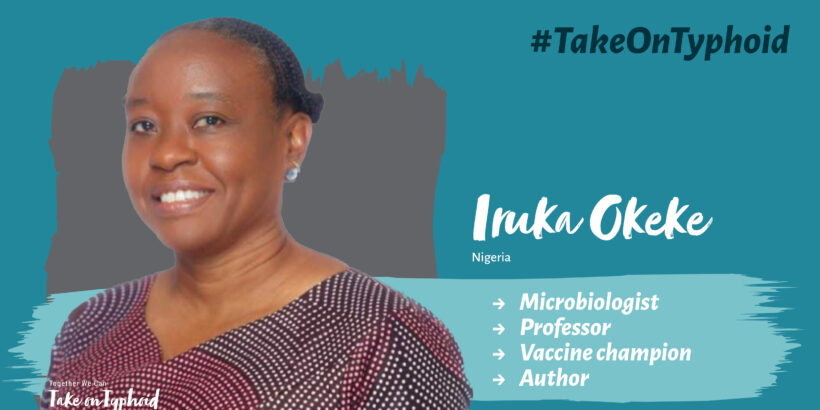Professor Iruka N. Okeke is a professor, researcher, mentor, and long-time champion of typhoid control. She lives and works in Nigeria, a typhoid endemic country that faces increasing threats from drug-resistant typhoid. Her research on typhoid and drug-resistant pathogens is crucial for decision-making and policy setting.
Importantly, Professor Okeke also works to mentor the next generation of typhoid researchers and champions, thereby extending her work and impact. As we think about the future of typhoid control, Professor Okeke is playing a sizeable role in Nigeria’s future.
What does gender equity mean to you?
It means that everyone, irrespective of gender, should be able to pursue opportunities and contribute to their own development and the wellbeing and progress of others. This may mean that we have to invest more to enable participation by some individuals. And when individuals do participate, their contributions should be acknowledged and rewarded, irrespective of their gender.
How do you embrace gender equity?
I work in academia, which is very male dominated, and we interface a lot with health care, where women do most of the work, but the credited leaders are more often male. Therefore, historical gender inequity and its impact today are very visible as we work. In addition to ensuring women scientists can develop themselves and participate in discovery, it is important to promote role models that showcase what is possible.
Many Nigerian women, explicitly or implicitly, are expected to invest more time and responsibility than male partners in care work and the home. We do everything we can to make it possible for women to pursue opportunities with us, irrespective of this expectation, and to still maintain societal credibility to the extent that they desire. This means, wherever possible, allowing staff and students flexibility about where and when they do their work, as well as working with willing funders to support maternity leaves and childcare that can enable women’s participation. Importantly, it also means acknowledging and supporting male team members who take on more childcare and home responsibilities than is typical in Nigeria. By doing this we can help to dispel stereotypes and misplaced societal expectations.
What progress have you seen in gender equality during your career?
I had female lecturers and role models as a student but they were not many. When I decided to pursue post-graduate education, many well-meaning people tried to advise me not to do it, or to pursue graduate training later in life. At the time, it was politically incorrect for a woman to hold a higher academic qualification than her husband so young women deliberately stalled their scholarly careers so as not to become ‘unmarriageable’. Today, while talented younger women are often still steered away from academic and scholarly pursuits, it is no longer considered odd for a woman to pursue a master’s or doctoral degree or apply to a prestigious fellowship. This may appear subtle, but it is enormous progress, even though there is a lot of work to be done to make it easy rather than simply “possible.”
Why is diversity in the workplace important?
The ‘industry’ in science is discovery. The more different and diverse ways of thinking you bring to a table, the greater the chance that you will identify a novel idea. Our backgrounds and training fashion us to think in certain ways. When we welcome people with different backgrounds, training, and skills, they bring in fodder for new ideas because they see perspectives that may be invisible to others. And when people see someone working in discovery science that has similar experiences, they will be more willing to consider coming to the table themselves.
Have you faced gender barriers in your career? If so, how did you overcome them?
Once, when I visited another country as a workshop resource person, I was not picked up at the airport because the driver expected “Dr Okeke” to be male. In the end, you make it to where you need to be somehow! It helps to have a few supportive people that can serve as mentors, sponsors, or role models—and I have all of these. However, as many of us have discovered by trying, most women are well prepared to scale barriers to education, work, and discovery. The social conditioning that makes many women successfully manage difficult households is also preparation to manage other challenging terrains, including the workplace. Part of societal conditioning is that we don’t talk about the transferability of these skills; this is why we need to dismantle hurdles for women more broadly and encourage preparation for girls and boys that makes both work and domestic spaces comfortable and conducive.
How do you plan to embrace gender equity going forward?
I moved back to Nigeria to set up a research group almost a decade ago and will continue along this very privileged path of doing excellent science with a diverse range of trainees and collaborators. I’m looking forward to my first generation of Nigerian trainees building their own groups that hopefully broaden access to science even more. There is a lot more we can do to make workplaces, including scientific workplaces, more hospitable for, and welcoming to, everyone.



